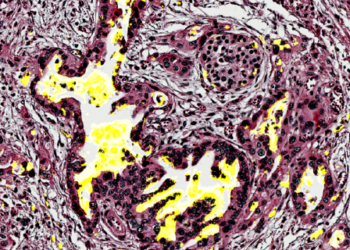COLUMBIA, Mo. ― Researchers from the University of Missouri School of Medicine found that a targeted gene therapy may make acute myeloid leukemia (AML) more sensitive to chemotherapy, while also protecting the heart against toxicity often caused by cancer treatments.
COLUMBIA, Mo. ― Researchers from the University of Missouri School of Medicine found that a targeted gene therapy may make acute myeloid leukemia (AML) more sensitive to chemotherapy, while also protecting the heart against toxicity often caused by cancer treatments.
Acute myeloid leukemia is the most common type of leukemia in adults and the resulting chemotherapy treatment can put patients at an increased risk for cardiac damage. Associate Professor of Medicine Dr. Xunlei Kang and PhD students Yi Pan and Chen Wang led a study looking at similarities between leukemia and cardiovascular disease. They found a shared target — AGTR1, a receptor responsible for cell reproduction, was overabundant in the blood cells of patients with leukemia.
The researchers used losartan, a common medicine for treating high blood pressure, to inhibit the AGTR1 receptor in mice. This disrupted cancer growth, slowing the development of leukemia and led to longer survival. The next step is to further investigate losartan’s effectiveness in treating human leukemia patients.
“Mouse models of leukemia differ from human disease in several ways, including differences in the immune system, the bone marrow microenvironment and responses to treatments,” Pan said. “We will now carefully interpret and validate these findings in human studies to ensure translational relevance,” Pan said.
If these findings are confirmed in human clinical trials, the approval process to use losartan would be shorter compared to other medications, since it’s already FDA-approved and will not require comprehensive data about the drug.
“When we treated mice with the AGTR1 inhibitor losartan, we observed that this commercially available drug shows great promise in reducing AML development while protecting against chemotherapy-induced cardiotoxicity,” Kang said. “This finding shows great potential to both enhance the success of chemotherapy while protecting the heart.”
Dr. Xunlei Kang, MD, PhD is an associate professor of medicine at the MU School of Medicine and focuses his research on blood conditions and stem cell study. He received his medical degree and doctorate from Shanghai Jiao Tong University in China.
“Inhibiting AGTR1 reduces AML burden and protects the heart from cardiotoxicity in mouse models” was recently published in the journal of Science Translational Medicine. In addition to Kang, Pan and Chen, authors include research specialists Wenxuan Zhou and Yao Shi; PhD student XiaDuo Meng, Hematology and Medical Oncology fellow Yasir Muhammad, MD; Richard D. Hammer, MD, professor of clinical pathology and anatomical sciences; De-Pei Li, MD, professor of medicine and associate director of the Center for Precision Medicine; Zhenguo Liu, MD, professor of medicine and chief of cardiology; and Gerhard Hildebrandt, MD, Chief of the Division of Hematology and Medical Oncology. Bei Jia and Hong Zheng from Penn State University College of Medicine also contributed to the paper.
Journal
Science Translational Medicine
Method of Research
Observational study
Subject of Research
Animals
Article Title
Inhibiting AGTR1 reduces AML burden and protects the heart from cardiotoxicity in mouse models
Article Publication Date
19-Jun-2024
COI Statement
G.H. is affiliated with Pfizer, Kite, a Gilead company, Incyte, Jazz Pharmaceuticals, Morphosys, Alexion Pharmaceuticals, Karyopharm Therapeutics, Seagen, Janssen, RAPA Therapeutics, Daichiy, Ono Pharmaceutical, AstraZeneca, CTI BioPharma Corp, Takeda, and Pharmacyclics. All other authors declare that they have no competing interests.
Discover more from Science
Subscribe to get the latest posts sent to your email.



